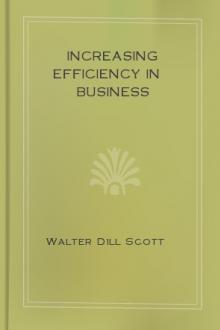Applied Psychology: Driving Power of Thought, Warren Hilton [each kindness read aloud .TXT] 📗

- Author: Warren Hilton
- Performer: -
Book online «Applied Psychology: Driving Power of Thought, Warren Hilton [each kindness read aloud .TXT] 📗». Author Warren Hilton
The wise application of this law will lead you to vigorous health and material prosperity. Its disregard or misuse brings deterioration and failure.
The distinction between wise use and misuse lies in whether disintegrating or creative thoughts, with their correspondingly energizing or depressing emotions or feelings, are allowed to hold sway in consciousness.
When we speak of energizing emotions or feelings we mean love, courage, brightness, earnestness, cheer, enthusiasm. When we speak of depressing emotions or feelings we mean doubt, fear, worry, gloom.
No elements are more essential to a successful business or a successful life than the right kind of emotional elements. Yet they are rarely credited with the importance to which they are entitled.
To the unthinking the word "emotion" has the same relation to success that foam has to the water beneath. Yet nothing could be farther from the truth. Emotion, earnestness, fire, enthusiasm—these are the very life of effort. They are steam to the engine; they are what the lighted fuse is to the charge of dynamite. They are the elements that give flash to the eye, spring to the step, resoluteness to the languid and certainty to effort. They are the elements that distinguish the living, acting forces of achievement from the spiritless forces of failure.
No man ever rose very high who did not possess strong reserves of emotional energy. Napoleon said, "I would rather have the ardor of my soldiers, and they half-trained, than have the best fighting machines in Europe without this element."
Emotional energy of the right kind makes one fearless and undaunted in the face of any discouragement. It is never at rest. It feeds on its own achievements. It is the love of an Heloise and the ambition of an Alexander.
It is this emotional energy that makes business passion, that makes men love their business, that brings their hearts into harmony with their undertakings, and that gives them splendid visions of commercial greatness.
Through all the ages great souls have drowsed in spiritless acquiescence until some tide of emotional energy swept over them, "as the breeze wanders over the dead strings of some Aeolian harp, and sweeps the music which slumbers upon them now into divine murmurings, now into stormy sobs." And then, and then, these Joans of Arc, these Hermit Peters, these Abraham Lincolns, these Pierpont Morgans, these warriors, statesmen, financiers, business men, salesmen, these practical crusaders and business enthusiasts, have sent out their influence into measureless fields of achievement.
Emotional energy generated on proper lines, and based on the support of a fixed intent, is a force that nothing can withstand, and we tell you that every idea that comes into your mind has its emotional quality, and that by the intelligent direction of your conscious "thinking" you can call into your life or drive out of it these powerful emotional influences for good or evil.
As Mr. Waldo P. Warren says, "Who can measure the value of an idea? Starting as the bud of an acorn, it becomes at last a forest of mighty oaks; or beginning as a spark it consumes the rubbish of centuries.
"Ideas are as essential to progress as a hub to a wheel, for they form the center around which all things revolve. Ideas begin great enterprises, and the workers of all lands do their bidding. Ideas govern the governors, rule the rulers, and manage the managers of all nations and industries. Ideas are the motive power which turns the tireless wheels of toil. Ideas raise the plowboy to president, and constitute the primal element of the success of men and nations. Ideas form the fire that lights the torch of progress, leading on the centuries. Ideas are the keys which open the storehouses of possibility. Ideas are the passports to the realms of great achievement. Ideas are the touch-buttons which connect the currents of energy with the wheels of history. Ideas determine the bounds, break the limits, move on the goal, and waken latent capacity to successive sunrises of better days."
Even without our telling you, you know that whenever a man makes up his mind that he is beaten in some fight his very thinking so helps on the fatal outcome.
The truth is, It takes just as much brain work to accomplish a failure as it does to win success—just as much effort to build up a depressive mental attitude as an energizing one.
Take for granted that you have the courage, the energy, the self-confidence and the enthusiasm to do what you want to do, and you will find yourself in possession of these splendid qualities when the need arises.
Consciously or unconsciously, you have already trained your mind to discriminate among sense-impressions. It perceives some and ignores others. For each perception it selects such associates as you have trained it to select. Have you trained it wisely? Does it associate the new facts of observation with those memory-pictures that will make the new ideas useful and productive of fruitful bodily activities?
If not, it is time for you to turn over a new leaf and habitually and persistently direct your attention to those associative elements in each new-learned fact that will make for health and happiness and success. Train your mind deliberately, and day by day, to such constant incorporation of feelings of courage and confidence and assurance into all your thoughts that the associated impulses to bodily activity will inevitably influence your whole life.
At the outset of every undertaking you are confronted with two ways of attacking it. One is with doubt and uncertainty; the other is with courage and confidence.
The first of these mental attitudes is purely negative. It is inhibitory. It is made up of mental pictures of yourself in direful situations, and these mental pictures bring with them depressing emotions and muscular inhibitions.
The second attitude is positive. It is inspiring. It is made up of mental pictures of yourself bringing the affair to a triumphant issue, and these mental pictures bring with them stimulating emotions and the impulses to those bodily activities that will realize your aims.
You have only to start the thing off with the right mental attitude and hold to it. All the rest is automatic. Think this over.
Put this same idea into your business. Analyze your business with reference to its mental attitude. Of course, you know all about its organization, its various departments, its machinery and equipment, its methods, its cost system, its organized efficiency. But what about its mental attitude? Every store, every industrial establishment has an air of its own, an indefinite something that distinguishes it from every other. This is why you buy your cigars at one place instead of at another.
Look behind the methods and the systems and all the wooden machinery of your business and you come to its throbbing life. There you find the characteristic quality that governs its future. There you find the attitude, the mental attitude, that pulls the strings determining the conduct of clerks and salesmen, managers and superintendents, and this attitude is in the last analysis a reflection of the mental attitude of the executive head himself—not necessarily the nominal executive head, but the real executive head, however he be called.
Does the truckman whistle at his work? Is the salesman proud of his line and his house? Does he approach his "prospect" with the confident enthusiasm that brings orders? Does the shipping clerk take a delighted interest in getting out his deliveries? They must have this mental attitude, or you will never win. Are you yourself "making good" in this respect? Remember that, whether you know it or not, your inmost thoughts are reflected in your voice and manner, your every act. And all your subordinates, whether they know it or not, see these things and reflect your attitude.
Therefore, in all you do, and in all you think, do it and think it with courage and with unwavering faith, fearing nothing.
Later on we shall instruct you in specific methods that will enable you to follow this injunction. For the present we must be content with emphasizing its importance.
In what follows in this book we shall bring forth no new principle of mental operation, but shall illustrate those already learned by reference to certain practical uses to which they can be applied. Our purpose in this is to impress you with the immense practical value of the knowledge you are acquiring, and to show you that this course of reading has nothing to do with telepathy, spiritism, clairvoyance, animal magnetism, fortune-telling, astrology or witchcraft, but, on the contrary, that in its revelation of mental principles and processes it is laying a scientific basis for a highly differentiated type of efficiency engineering.
In the preceding volume, entitled "Making Your Own World," you learned that reaction-time is the interval that elapses between the moment when a sense-vibration reaches the body and the moment when perception is made known by some outward response.
Reaction-time can be made to furnish a clue to the adaptability of the individual for any business, profession or vocation.
To determine the character, accuracy and rapidity of the mental reactions of different individuals under different conditions, various scientific methods have been evolved and cunning devices invented.
There are decisive reaction-time tests by which you may readily map out your own mentality or that of any other person, including, for instance, those who may seek employment under you.
Have you been harboring the delusion that "quick as thought" is a phrase expressive of flash-like quickness? Have you had the idea that thought is instantaneous? If so, you must alter your conceptions.
The fact is that your merely automatic reactions from sense-impressions can be measured in tenths of a second, while a really intellectual operation of the simplest character requires from one to several seconds.
An important thing for you to know in this connection is that no two people are alike in this respect. Some think quickly along certain lines; some along other lines.
And the man or woman that you need in any department of your business is that one whose mind works swiftly in the particular way required for your business.
How rapidly does your mind work? How fast do your thoughts come, compared to the average man in your field of activity?
How fast does your stenographer think? Your clerk? Your chauffeur?





Comments (0)